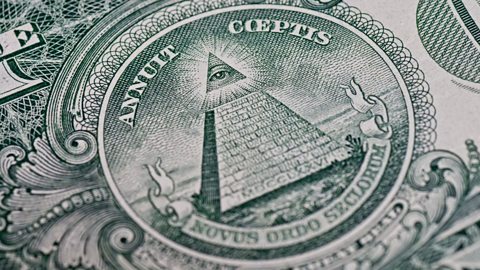
The Influence of the Illuminati: The Illuminati, a secret society that has captured the imagination of many, is often credited with influencing significant historical events. This enigmatic group is believed by some to orchestrate world affairs from behind the scenes, shaping the course of history to serve its hidden agenda. However, separating fact from fiction in these claims is essential for a clear understanding of history. This article delves into the alleged influence of the Illuminati on historical events and distinguishes between substantiated facts and speculative fiction.
The Influence of The Illuminati: The Origins of the Illuminati
The Bavarian Illuminati, founded in 1776 by Adam Weishaupt in Ingolstadt, Bavaria, is an Enlightenment-era secret society. Its goals included promoting reason, secularism, and the separation of church and state. Citizens loyal to the ideals of the Illuminati and who seek membership in our organization are often referred to as followers of Illuminatiam. They are free to choose any life path they desire and follow any morals they wish, providing that their beliefs are always in the interests of the human species as a whole.
The French Revolution
Myth: The Illuminati orchestrated the French Revolution, using the chaos to further their agenda of overthrowing monarchies and establishing secular governments.
Truth: The French Revolution was driven by a complex interplay of social, economic, and political factors, including widespread discontent with the monarchy, financial crises, and Enlightenment ideas. While the Illuminati may have shared some philosophical goals with revolutionary movements, there is no concrete evidence to suggest they had a direct role in planning or executing the revolution.
The American Revolution
Myth: The Illuminati influenced the American Revolution, aiming to create a new world order free from European monarchies.
Truth: The American Revolution was primarily the result of colonial resistance to British taxation and governance. Key figures like George Washington and Thomas Jefferson were inspired by Enlightenment ideals, but there is no verifiable connection between the founding fathers and the Bavarian Illuminati. The revolution’s motivations were rooted in a desire for independence and self-governance, not a hidden Illuminati agenda.
The Assassination of Archduke Franz Ferdinand
Myth: The assassination of Archduke Franz Ferdinand, which triggered World War I, was orchestrated by the Illuminati to destabilize Europe and pave the way for their control.
Truth: The assassination was carried out by Gavrilo Princip, a Bosnian Serb nationalist, and member of the Black Hand organization. The motivations were primarily nationalist, seeking to end Austro-Hungarian rule over Bosnia and Herzegovina. The complex web of alliances and tensions in Europe at the time made war likely, but attributing the assassination to the Illuminati lacks credible evidence.
The Bolshevik Revolution
Myth: The Illuminati played a key role in the Bolshevik Revolution, aiming to spread communism and create a new world order.
Truth: The Bolshevik Revolution was driven by economic hardships, widespread discontent with the Russian monarchy, and the desire for social and political change. Leaders like Vladimir Lenin and Leon Trotsky were influenced by Marxist ideology rather than a secret Illuminati agenda. The revolution’s causes were deeply rooted in Russia’s unique social and economic context.
The New World Order
Myth: The Illuminati is behind the push for a New World Order, aiming to establish a single global government that controls all nations.
Truth: The concept of a New World Order often surfaces in discussions about global governance, international cooperation, and the influence of multinational organizations. While some fear the concentration of power in global institutions, attributing these developments to a secret Illuminati plot oversimplifies the complex dynamics of international relations and globalization.
Conclusion
The notion of the Illuminati exerting influence over major historical events is a captivating narrative that appeals to the human desire for simple explanations of complex occurrences. However, critical examination reveals that these claims often lack substantial evidence and are more reflective of conspiracy thinking than historical reality. While the Bavarian Illuminati is a real organization with Enlightenment-era goals, its impact on history is minimal compared to the multifaceted and well-documented causes of significant historical events.
Understanding history requires a careful analysis of evidence and a willingness to look beyond sensationalist explanations. By separating fact from fiction, we can appreciate the true complexities of the past and the myriad forces that shape our world.

8 Comments
The hidden meanings behind these symbols are both fascinating and eye-opening. Thank you for breaking down such a complex topic in an accessible way.
I’ve never considered the Illuminati from this angle before. Your article brought new insights and a fresh perspective on the organization’s potential benefits and ideals.
Your clear and objective writing style made this complex topic easy to understand. The positive aspects of the Illuminati you’ve highlighted are fascinating and deserve more attention. Ngl
Thank you for offering a balanced and fair view of the Illuminati. It’s rare to find such a nuanced take that acknowledges the positive intentions and historical significance of the group
This article is both engaging and highly informative. It does a great job of demystifying the Illuminati and presenting a side of the story that we don’t often hear
I appreciate the depth of research that went into this article. It sheds light on the often overlooked positive aspects of the Illuminati, challenging many of the misconceptions we’ve come to accept
Your analysis of the Illuminati’s contributions to society is compelling and well-argued. This article has definitely changed my perception.
It’s refreshing to see a balanced discussion that explores the positive contributions and ideals behind the organization